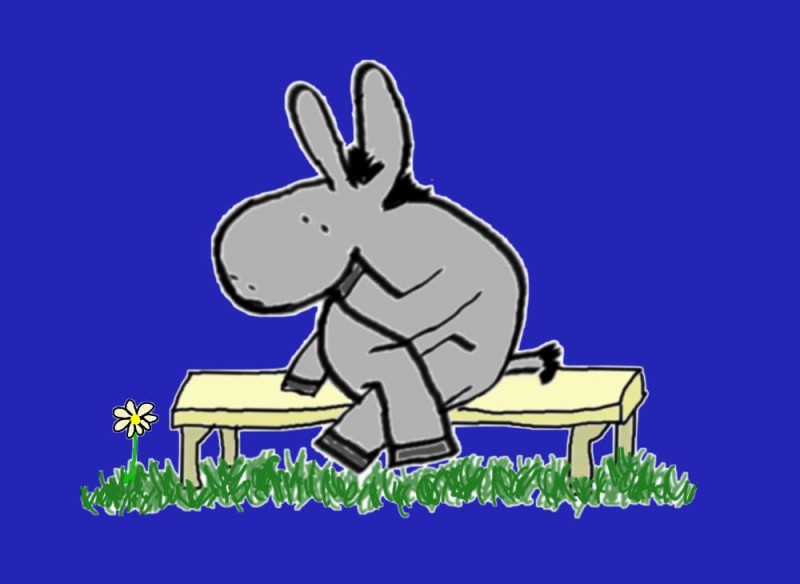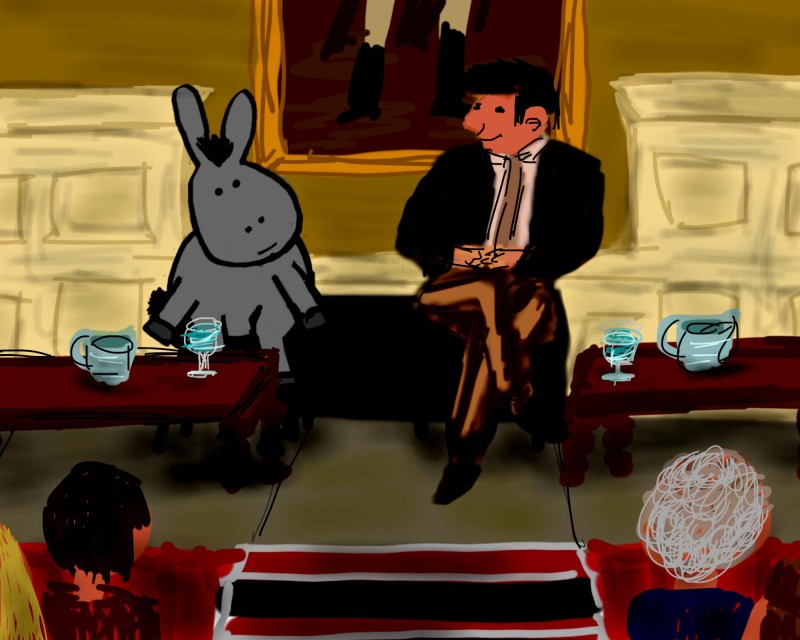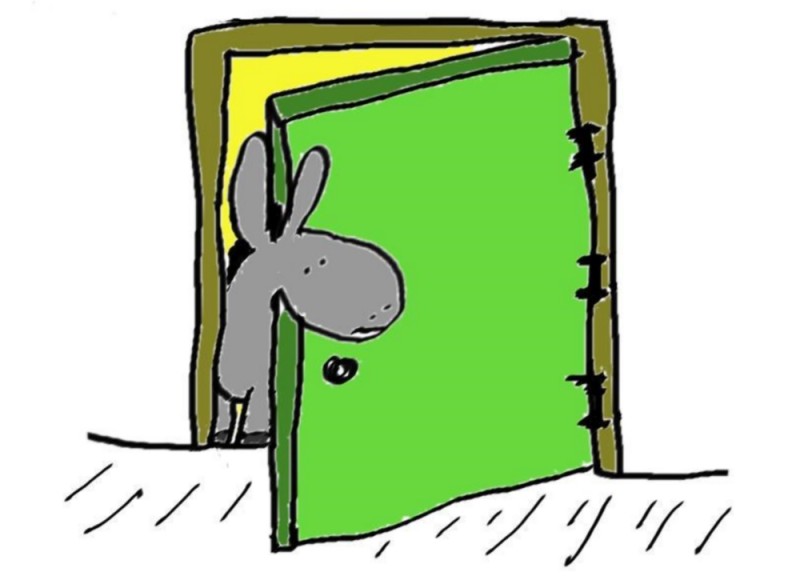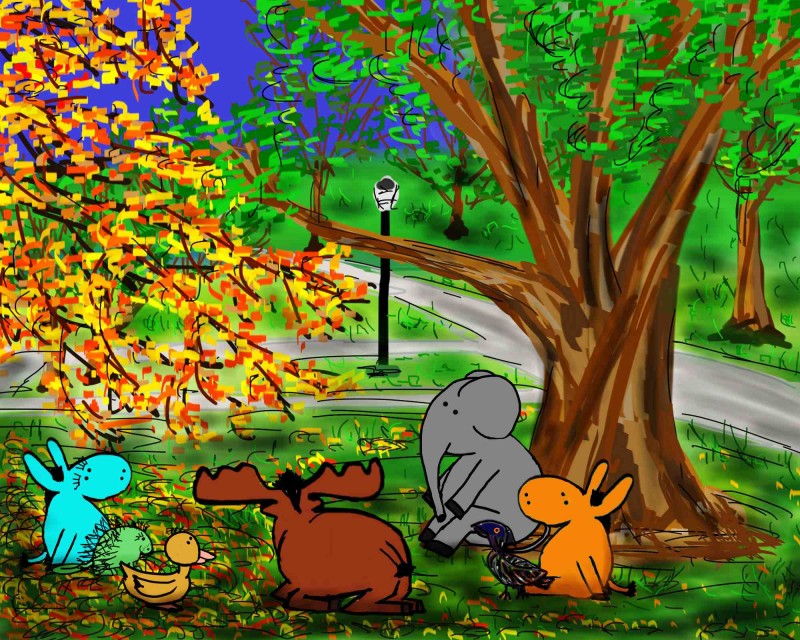Well, thought Blurtso, that was quite a year. It was exciting. I read and I wrote and I thought and I spoke. My mind is spinning. I wonder how long it will spin? I wish I could make it stop… Hey! Is that a daisy?
Tag: how to deal with
“Blurtso stands in the snow” (V)
Welcome to tonight’s discussion sponsored by “The Campus Institute of Political Seriousness for Enhanced Living in an Unenhanced World.” I’m your host, Jonathan Wellborn Truington III, and joining us this evening is Mr. Blurtso Lundif, a third-year diversity fellow at Harvard College, who has garnered attention in Cambridge as, “the donkey who stands in the snow.” Please tell us, Mr. Lundif, if you would, what is your opinion of the current political climate in our nation’s capital? The political climate? said Blurtso. Yes, said Mr. Truington. I don’t know anything about it, said Blurtso. Do you think, said Mr. Truington, that the politicians should all go stand in the snow? It couldn’t hurt, said Blurtso. And what have you accomplished, said Mr. Truington, by standing in the snow? Accomplished? said Blurtso. Yes, said Mr. Truington, what have you learned? I’ve learned to stand still, said Blurtso. To stand still? said Mr. Truington. Yes, said Blurtso. Anything else? said Mr. Truington. Isn’t that enough? said Blurtso. Well, said Mr. Truington, I suppose it is… and where exactly do you stand? Anywhere, said Blurtso. Anywhere? said Mr. Truington. Yes, said Blurtso, anywhere that’s snowy and cold. Is there something, said Mr. Truington, that inspires you to do it? Yes, said Blurtso, it’s compelling to stand in a public place that is empty… and where, if someone does appear, they move so quickly they may as well not be there. I see! said Mr. Truington, standing in the snow is an indictment of the modern world and its frenetic pace! Is it? said Blurtso. Does it bother you, said Mr. Truington, if others stand in the snow next to you? No, said Blurtso, as long as they don’t ask questions. Questions? said Mr. Truington. Yes, said Blurtso, about why I’m standing in the snow. Of course, said Mr. Truington, and apart from your scathing attack on people in a hurry, what other statements are you trying to make? Are you attempting to draw attention to a charitable cause? Are you trying to see how long you can stand before collapsing? No, said Blurtso, I go home whenever I want. And how do you know, said Mr. Truington, that it’s time to go home? As soon as I start walking, said Blurtso, I know it’s time to go. Remarkable, said Mr. Truington. Well, ladies and gentlemen, there you have it, neither ice, nor sleet, nor snow will stop this remarkable coed from making his stand. Please join us next week when our featured speaker will be Somerville’s own self-deprecating playwright and hairbrush salesman, Reverend Willy J. Loman.
“Blurtso goes up for promotion”
“Weohryant University” (XIX) – Where 101
Today’s question, said Harlan, is: “Where did it go?”
Where did what go? said Chelsea.
It was here just a minute ago, said Morton.
I didn’t take it, said Emma Lou.
Neither did I, said Frank.
Do you mean “ubi sunt”? said Glouster.
Ubi sunt? said Morton.
“Ubi sunt,” said Glouster, is Latin for “Where are they?” It comes from a Latin poem that begins, “Ubi sunt qui ante nos in mundo fuere?” which translates: “Where are they who, before us, existed in the world?” It was a common theme in medieval poetry, and was most famously expressed by the French poet, François Villon who asked, “Où sont les neiges d’antan?” or “Where are the snows of yesteryear?”
The snows of yesteryear? said Morton.
I don’t like snow, said Chelsea.
Neither do I, said Frank.
I don’t mind it, said Emma Lou, so long as I’m not far from my den.
Why would anyone worry about last year’s snow? said Morton.
It’s a metaphor, said Glouster, for all the things you’ve lost in your life.
Lost? said Chelsea.
Yes, said Glouster, the things you had in the past that you no longer have.
The things I’ve eaten? said Morton.
Yes, said Glouster, and the friends you’ve lost, and your lost youth.
My lost youth? said Chelsea.
Yes, said Glouster.
I’m not going to lose my youth, said Chelsea.
Of course you are, said Glouster.
Really? said Chelsea.
Yes, said Glouster.
In that case, said Chelsea, I don’t like “ubi sunt.”
Crows live forever, said Frank.
They do? said Morton.
Sure, said Frank, crows, or “ravens”, and nightingales, and even some other birds.
Are you sure? said Morton.
Yes, said Frank, just ask Edgar Allen Poe and John Keats.
Who are they? said Chelsea.
They are poets, said Frank, who wrote about birds who live forever, birds who travel from heaven to earth to hell and then back again.
Have you been to heaven and hell? said Chelsea.
No, said Frank, not yet.
I don’t want to go to hell, said Morton.
Heaven and hell, said Glouster, are metaphors for, “the realm of the dead.”
I don’t want to go there either, said Morton.
Maybe, said Chelsea, that’s where the “ubi sunts” are.
I know a song, said Frank, about “ubi sunt.”
What’s it called? said Chelsea.
It’s called “The Ashgrove,” said Frank, and it has a blackbird in it.
How does it go? said Chelsea.
I don’t remember all the words, said Frank, but it’s about a woman who loses her lover and looks for him in an ashgrove.
Does she find him? said Chelsea.
No, said Frank, he’s buried beneath the green turf.
Is that a metaphor for “the realm of the dead”? said Morton.
Yes, said Frank.
Why doesn’t the blackbird, said Chelsea, fly to the realm of the dead, talk to the dead lover, then return and talk to the woman so she can have a sense of closure?
That’s a good question, said Frank.
What’s closure? said Morton.
Closure, said Chelsea, is talking with your ex-lover until you have nothing more to say.
Why would you want to do that? said Morton.
Because, said Chelsea, if you say everything you have to say, you can stop thinking about him when he’s gone.
So he doesn’t become an “ubi sunt”? said Morton.
Yes, said Chelsea.
I would like to be an “ubi sunt”, said Emma Lou.
So would I, said Glouster.
Why? said Chelsea.
Because, said Glouster, I don’t want to be forgotten.
Being forgotten, said Emma Lou, would be like a second death.
Maybe it’s a good thing, said Morton, for people to go around asking “ubi sunt?”
Why? said Chelsea.
Because, said Morton, it keeps the dead from dying.



